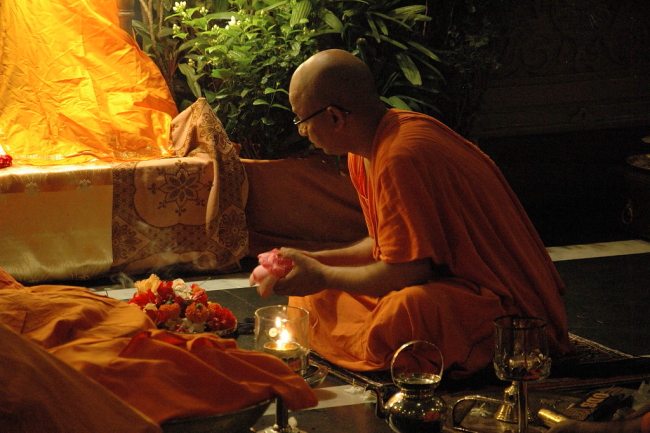
A devotee observes Rama Navami. Photo by Ramakrishna Math and Ramakrishna Mission Belur Math, courtesy of Flickr
THURSDAY, MARCH 30: The story of Lord Rama has been read, recited, and reviewed by Hindus worldwide, during a period known as Ramayana Week—all leading up to today’s climactic festival, Ram Navami. (Spellings vary; Ramanavami and Ramnavami are also common spellings.)
NEWS 2023: The Iskcon Temple in New Delhi will be organizing 25th-anniversary celebrations March 26-30, with more than 4,000 guests expected for the events. (Read more here.) The temple was inaugurated on Rama Navami in 1998.
RAMA: THE SUN, FASTING AND A WEDDING
Celebrated as the birth of Lord Rama, the seventh avatar of Vishnu, Ram Navami recalls the righteous, peaceful and presperous reign of the ancient kingdom under Sri Rama. The epic Ramayana, read during Ramayana Week, tells the exciting and thrilling adventures of Rama and the widespread anticipation of the long-awaited heir of King Dasharath of Ayodhya. Many Hindus believe that listening to the story of Rama cleanses the soul.
Did you know? According to studies, the birth of Rama may have been in January of 4114 BCE.
Legend has it that Rama was born at noon: Rama’s dynasty has been linked with the sun, and at noon, the sun is at its brightest. At home, Hindus set pictures of Lord Rama, his wife (Sita), Hanuman and Lakshman in places of importance; puja is performed with joy. It is common to fast from onions, wheat products and several other foods on Ramanavami, and community meals free of these foods share the gaiety of the festival. In temples, fruits and flowers, Vedic chants and mantras are offered to Sri Rama. In South India, the wedding of Rama and Sita is ceremonially recognized, while in parts of North India, chariot processions attract thousands of visitors. (This year, due to pandemic guidelines, some festivities will be withheld or altered.)
Did you know? Gandhi said that Ramrajya, the peaceful reign of Lord Rama, would be the ideal state of India following independence.
AN ALTERNATE BIRTHDAY: SWAMINARAYAN JAYANTI
While the majority of India is celebrating Sri Rama, many Hindus also recall the birthday of the founder of the Swaminarayan tradition within Hinduism. In stark contrast to the millennia-old commemorations of most Hindu deities, this jayanti marks the birth of an 18th-century figure who lived into the 19th century. Lord Swaminarayan was born in North India and traveled across the country as a social and moral reformer. Today, his devotees sing, fast and offer food at temples, with a late culmination at 10:10 p.m.—the documented time of his birth.